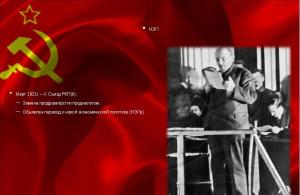I am a certified culturologist, moreover, a culturologist-teacher, with a specialization in “Russian Culture”. Before entering the university, I went to preparatory courses, where the teachers said that cultural studies belonged to the future, over time it would turn the life of mankind upside down, and that soon there would be nothing - just continuous cultural studies.
18 years have passed since that moment; after graduating from university, I never worked specifically as a culturologist, but still, throughout my post-graduate years, I worked in areas that were in one way or another related to what I was taught at the department of culturology. First of all, this is journalism (and “type of journalism” with writing texts for websites, and normal newspaper and magazine journalism in well-known publications), secondly, an area related to historical science: now I work in a company engaged in genealogical research, and this presupposes the need for some kind of general historical and, in general, some kind of general factual background.
In my opinion, an important part of cultural studies education is not that you will be taught to understand art or culture in general, this is probably difficult to teach, but that in five years you can gain the very general background that then allows you to use at your own discretion. You have five years to read, learn to structure information, and be able to more or less decently express thoughts. By and large, this all sounds very impractical, but in fact it’s not :)
There are many professions, but
Most beautiful of all - (...)
Who came into this world -
Became happy forever.
Firstly, this, in my opinion, is the most interesting of the specialties (humanities), because by studying to be a cultural scientist (and I’m already convinced of this), you can touch on a lot of theories and stories that our other inhabitants will find boring (and by the way , using these theories you can trace previously unnoticed subtleties of society and culture). For example, cultural theory (masses, elites, typology of cultures - west, east, south, north; various concepts of culture, etc.). Also history- here the choice is brighter - history of music, art, philosophy, literature, history of world culture in general and also etc. P.S.: although the curriculum is probably different for all universities, here we teach cultural studies like this...
Secondly, I will address the topic of the question directly. A culturologist is a universal specialist.
Armchair:
- philologist (if literature is interesting);
- historian (understandable, right?);
- social philosopher (this, in my opinion, is the most understandable and easy-to-understand area of philosophy);
- art critic (here is a synthesis of office and visiting).
I think that's it.
Outcall:
- archaeologist (or call yourself an “archaeologist” in order to visit the excavation site where the past is resurrected);
- ethnologist (here we describe different peoples, ethnic groups, ethnic groups, etc., i.e. wandering around the planet);
- art critic in terms of foreign museums (in the first category one can interpret “art critic” in terms of domestic museums and galleries).
I think I explained it clearly, albeit incompletely and with all sorts of inconsistencies (if an experienced reader reads this answer), but so far so :)
Or you can even put it this way: cultural studies is fun and educational :)
Who is a culturologist and what does he do? It is perhaps not so easy to understand this: most often on the Internet you can only see vague descriptions and meager definitions of the profession. But in fact, this rather rare profession covers an entire sphere - the sphere of culture. So how exactly can you realize yourself in this direction?
Specialists in cultural studies, who have an uncontrollable thirst for science, are enthusiastically engaged in scientific research, write articles for scientific and popular science publications, teach, and work on the creation of educational and methodological manuals. The training of such specialists (qualification “Culturologist-researcher. Teacher”) is successfully carried out in (specialty “Culturology. Fundamental Cultural Studies”) and in (specialty “Theory and History of Culture”).
Today, specialties in which cultural studies is studied as an applied discipline are gaining great popularity. In this case, the qualification “Cultivator-Manager” is awarded. The word “manager” itself comes from the English verb “manage”, which means “to manage”. Such a specialist has the opportunity to get a job in various companies, publishing houses, and media as a consultant on cultural issues. Communication skills and the ability to express one’s thoughts orally open up other opportunities, such as working in museums, archives, libraries, and art galleries. Conducting excursions, implementing innovative cultural projects (including international ones), organizing events and holidays, as well as other activities related to culture are within the capabilities of a cultural specialist-manager. We should not forget about the Ministry of Culture, where cultural experts at the highest level take care of the preservation and development of national culture and traditions.



The qualification “Culturologist-Manager” can be obtained in (specialty “Culturology. Applied Cultural Studies”), (specialties “Information Systems in Culture”, “Management of Advertising and Public Relations”, “Management of the Social and Cultural Sphere”, “Management of International Cultural Relations” ) and (specialty “Culturology. Applied cultural studies”).

In secondary specialized and vocational educational institutions it is possible to obtain the qualification “Organizer of cultural and leisure activities”, both on the basis of general secondary education (11 grades) and on the basis of general basic education (9 grades). This qualification differs from the profession of culturologist-manager in that it is tied to a specific type of art - music, choreography, etc. Such specialists are trained throughout Belarus.
The most common entrance exams:
- Russian language
- Mathematics (basic level)
- Social studies is a core subject, at the choice of the university
- History - at the choice of university
- Computer science and information and communication technologies (ICT) - at the university's choice
Culturology is a discipline that appeared in our country only in post-Soviet times and has absorbed world experience, the heritage of both our country and humanity as a whole. Due to the relatively short period of time in the development of science, professional research areas in this field remain mobile, and the range of interests of specialists in this field includes many different movements, ranging from historical semantics to the latest works of art of visual culture. Despite the recent development of domestic science, domestic cultural education is considered one of the most fundamental and promising in the world. Young, developing science attracts future applicants who know how to appreciate beauty, who strive to enrich the cultural heritage of their own country and humanity as a whole, who are ready to make efforts to increase the level of spiritual and material culture of the state.
Admission conditions
As already noted, the Russian school of cultural studies is one of the strongest in the world. The high level of training of future graduates is largely due to the fact that from the stage of enrollment in a university, students’ education is focused on understanding the values of cultural and artistic heritage. As entrance exams, future students will have to take history (or computer science), Russian language and social studies (major); a foreign language is taken at the university's choice.
Future profession
In the field of prof. Graduate activities include analysis of cultural processes, forecasting their development, preparation of creative programs, organization, subsequent coordination of international cultural relations, art management, examination of artistic values.
The main task of a culturologist is to study the processes of emergence and subsequent historical development of certain types of art, life and traditions of ethnic unities, and excursion activities. In recent years, cultural experts have been actively involved in television projects. And since the profession of culturologist is new on the domestic labor market, prospects for career growth in any of the above-mentioned fields of activity open up before you.
Where to apply
Today, the following universities in the country are training future cultural specialists:

Training period
The duration of study (full-time) is 4 years, part-time - 5 years.
Disciplines included in the course of study
The training program for future bachelors of cultural studies is an organic synthesis of the most important elements of world educational practice with the most important achievements of Russian higher education, orienting the student not only to obtain theoretical knowledge, but also facilitating the assimilation of new information by future professionals, promoting the development of creative and heuristic capabilities, and developing the ability to synthesize fragmented knowledge about the world.
The implementation of the educational program involves obtaining fundamental theoretical knowledge in such course disciplines as:
- philosophy, theory of culture;
- cultural history;
- Mass culture;
- culture of mass communications;
- intercultural communications;
- mythology of holiday culture;
- visual culture;
- management of the socio-cultural sphere;
- history of cultural studies;
- history of domestic and foreign art, etc.
During the training process, students undergo museum, archaeological and research practices.
Acquired skills
In the process of training, the future specialist develops the following profs. competencies, skills:

Job prospects by profession
Graduates of the direction will be able to successfully work in the research, scientific, and teaching fields. Bachelors of cultural studies are in demand in research institutes and design organizations related to the study of culture, development, and preservation of cultural heritage; state institutions, public organizations involved in the protection of historical and cultural monuments, carrying out cultural management processes. Cultural knowledge includes various branches of the humanities, which guarantees the future specialist social mobility and allows him to easily comprehend the specifics of related specialties and professions. A cultural studies graduate can hold the following positions:
- art critic;
- theater critic;
- television critic;
- film criticism;
- music critic;
- teacher;
- museologist;
- research fellow;
- art manager;
- literary editor.
The prospects for the development of this area suggest that this list of professions may in the near future be supplemented by specialties that are just beginning to take shape in the labor market today.
The minimum salary threshold for an employee of a research institute or museum is 10,000 rubles. In turn, art managers and outstanding critics receive other amounts.
Prospects for professional development of graduates
A bachelor of cultural studies can continue his own self-improvement in a master's program in any profile of the humanitarian cycle. If you choose the direction of cultural studies, upon completion of your master's degree, you will be awarded the title of Master of Cultural Studies. A master's degree allows you to carry out professional activities outside the country without undergoing re-certification and additional procedures. Continuing your studies in a master's program will allow you to continue developing scientific competence, deepen your knowledge of your chosen field, and begin teaching activities, writing and designing your own scientific publications. A master's thesis can be the first step for subsequent studies in graduate school, doctoral studies, or obtaining the honorary title of professor.
A culturologist is a scientific specialist who studies the characteristics, history of the development and formation of various types of art, architecture and life of various peoples.
Wage
25,000–40,000 rub. (rabota.yandex.ru)
Place of work
Culturologists work in schools, research institutes, museums, nature reserves, and universities.
Responsibilities
The activities of a cultural scientist are conventionally divided into four areas: research work, teaching, excursion activities, and writing popular science articles and books.
Scientific work is the main one. A culturologist studies the history of the formation and peculiarities of life of various nationalities: conducts research, conducts experiments, records the results in scientific articles and books. It is almost impossible to be an expert in all areas. Therefore, cultural scientists specialize in studying certain problems in the field of world culture.
Additional responsibilities of cultural experts are: conducting excursions in museums and ancient buildings, giving lectures at universities, and writing books.
Important qualities
The profession cannot do without such qualities as: an analytical mind, a penchant for desk research, accuracy, attentiveness and responsibility.
Reviews about the profession
“Culture is larger, more important, more systemic - stronger than the institutions of the state, which is, of course, the largest player in all spheres of life. It has many functions. It is the customer, appraiser, censor, manager, protector. It can speed up or slow down, help or hinder, support or spread rot. But in big Time the state is not able to win, to completely overcome cultural prescriptions.”
Daniil Dondurey,
culturologist
Stereotypes, humor
Culturologists are often involved as experts and consultants on cultural issues of various countries. Their task is to identify and assess humanitarian risks in engineering, social, economic and political projects. Therefore, the profession can hardly be called boring and monotonous.
Education
To work as a culturologist, a higher specialized education is required. You can study, for example, at St. Petersburg State University, St. Petersburg State University of Water Communications, Leningrad State University named after A. S. Pushkin, Russian Christian Humanitarian Academy.
Humanitarian universities in Moscow: Moscow State Pedagogical University, Institute of Humanitarian Education and Information Technologies, Moscow State University named after M. V. Lomonosov.
Vitaly Kurennoy, Head of the Department of Cultural Studies at the National Research University Higher School of Economics: …culture is increasingly emerging as a significant factor in modern economics, politics and social life. This is reflected in the popularity of topics such as the creative economy, cultural industries, and the creative class. In the mass consciousness, culture gradually ceases to be associated with some isolated area of high art that exists in museums and other closed spaces; it spills out into everyday life in the form of a request for the aestheticization of our experience, turns into an economic resource, into a key element in the development of the urban environment.
— Vitaly Anatolyevich, what is cultural studies in modern Russia?
— Culturology is a discipline that arose in Russia in post-Soviet times; before that, no cultural studies existed in our country. In its genesis, Russian cultural studies is very heterogeneous. On the one hand, it focused on individual major scientists - Sergei Sergeevich Averintsev, Yuri Mikhailovich Lotman and, in general, that intellectual phenomenon called the Moscow-Tartu semiotic school, and so on. Here I can also mention our colleagues in the department - Galina Ivanovna Zvereva and Alexander Lvovich Dobrokhotov. On the other hand, there was a massive influx of intellectuals who, due to new political circumstances, found themselves “out of work” - for example, party historians. Therefore, I would say that today cultural studies in Russia is very heterogeneous: there are individual strong centers, but to a large extent this is not a completely prosperous area. In terms of content, certain original concepts that have almost no correlation with the international context of cultural studies still flourish here.
And yet it cannot be said that the formation of cultural studies took place in our country in complete isolation from the main world trends in humanities. The emergence of cultural studies in Russia formally and disciplinaryly recorded the “turn to culture” that was intensively taking place throughout the world during the second half of the 20th century. The already mentioned Moscow-Tartu school, in the general direction of its activities, also corresponded to the general humanitarian “linguistic turn”, and to some extent to those advanced intellectual trends that were unfolding at that time in the Western humanitarian environment - for example, French structuralism. In addition, we should not forget that it was during the Soviet period that concepts were formulated that had a significant influence on various Western cultural research programs. First of all, it is necessary to name the works of Russian formalists, as well as the works of Mikhail Bakhtin and Valentin Voloshinov. True, I would hardly exaggerate if I say that they were received more productively abroad than in Russia.
If we talk about today's cultural studies internationally, I would note that this is one of the most dynamic research areas. We are, of course, in no way talking about some kind of homogeneous discipline, some kind of “Science of Culture” with a capital S, as someone is trying to present it. It would be more correct to talk about the presence of various research programs and projects that have different cycles of existence, but are being developed very actively.
To this day, this area is significantly influenced by the British program of cultural studies that emerged in the 1960s, a politically leftist direction in critical cultural studies.
There are many areas related to historical semantics (“history of concepts”), most recently visual studies, performative studies, various types of urban studies, media and popular culture studies, receptive studies, etc. As for the research of visual culture, I note that my colleagues and I are currently working intensively on the corresponding project for our second master’s degree - at the moment this is a very promising area both in research and in application.
In addition, the classical humanities over the past decades have largely made, so to speak, their own turn towards culture. Neither modern economics, nor sociology, nor political research can be imagined without turning to the analysis of culture, which is expressed in the emergence, for example, of cultural sociology, in various versions of institutional economics, and so on. In some areas of research, I would now even find it difficult to draw the line between sociology and cultural studies. Interdisciplinary research is also impossible to imagine without cultural studies.
But changes in science do not appear by themselves; they respond to demands coming from our social experience. It is easy to see that culture is increasingly emerging as a significant factor in modern economics, politics and social life. This is reflected in the popularity of topics such as the creative economy, cultural industries, and the creative class. In the mass consciousness, culture is gradually ceasing to be associated with some isolated area of high art that exists in museums, conservatories and other closed spaces; it spills out into everyday life in the form of a request for the aestheticization of our experience, turning into an increasingly noticeable economic resource, a key element of development urban environment.
— What needs to change for our cultural studies to join the global context and become more practical, closer to life?
— The strategies here are clear, but they require significant efforts to update the entire field of Russian cultural studies.
The first is an emphasis on modern theory and overcoming conceptual backwardness. The theoretical apparatus of Russian cultural studies is closer to the 19th than to the 21st century. It is necessary to include whole layers of methodological and theoretical research tools in educational and scientific circulation, update the conceptual apparatus, and introduce new description languages.
The second is active research work, including integration into large international cultural research programs. By the way, the HSE Department of Cultural Studies is taught by a very large number of specialists who have Western PhD degrees, and some simply alternate between working at Western universities and here - we resolved the issue of international integration immediately and without any provincial discounts. Of course, unlike, say, mathematics or scientific approaches with a pronounced quantitative component, cultural studies inevitably have a national and local profile. But we should not be isolated in the theoretical or methodological sphere.
Let me add one more consideration to this. It is critically important for Russian cultural studies to overcome a kind of “philologism.” This is not a reproach for philology, it’s just about reorienting cultural studies towards current sociocultural reality, and not limiting ourselves to the space of a desk, practicing a kind of cultural escapism. We have a colossal failure in knowledge about modern Russian culture - and no less, by the way, about its recent past. The Soviet years left an imprint on modernity in the sense that in the USSR access to the study of current reality was always strictly limited and controlled, which, of course, prompted researchers to retreat into the ivory tower and deal with issues far from the reality around them. As a result, within the framework of cultural studies, there has been a clear shortage of field, cultural and anthropological work. Today's journalists are often better at describing what is happening in the country than the scientists who, it would seem, should be on the front line here. This is why, by the way, we pay so much attention to our research practices - for the second year now we have been conducting a summer research internship in Torzhok. If such efforts are not systematically made, a situation will be reproduced in which students are better informed about the latest intellectual fashions in France than about what is happening simply on the street - outside the library window.
Third, constant attention to updating the research strategies of related scientific disciplines. Without modern sociology, economic and political theory, cultural studies quickly turns into either an esoteric “bead game” or unnecessary speculation about Mickey Mouse - this is well known from the sad experience accumulated both here and abroad.
Fourth, it is necessary to develop applied cultural studies. To implement projects in the field of culture - in the modern, broad sense of the word - a special set of competencies and skills is required: organizational, managerial, information. We have a huge field of work ahead of us. This can be called the sphere of cultural entrepreneurship, and our master’s program “Applied Cultural Studies” is aimed at developing this area. But, of course, productive activity here is impossible without certain analytical skills, without knowledge and understanding of the processes of modern culture.
In fact, when the HSE Department of Cultural Studies was created, we proceeded from precisely this concept of cultural studies. At the same time, we, of course, proceed from the specifics of our university, the advantages that cooperation with the scientific and educational departments existing here provides us.
— What do people with cultural studies education usually do in Russia, and how does the training of such specialists at HSE differ?
— Cultural scientists can work in the field of education and engage in research work. But researchers are a piece of goods; it is more of a vocation than a profession. However, the task of updating this scientific and educational environment is very urgent, and research in this area is promising.
The second professional opportunity is contemporary cultural industries; a mobile environment of cultural projects, developing primarily in large cities and associated, roughly speaking, with the commercialization of cultural and creative activities. The rapidly emerging labor market is marked by increasing activity in updating cultural heritage, primarily at the regional level. People with relevant competencies and professional skills are in extraordinary demand. Also traditional cultural institutions - museums, libraries and other institutions. They are today in a completely new situation for themselves, when they are not provided with a guaranteed audience, formed under the pressure of state educational policy, but must actively form their audience. Management competencies alone are not enough for this. It is important to understand the main trends of modern culture and the needs of the audience - our graduates are well prepared to solve such problems.
Finally, I would include the third area of professional employment in the media sector, which is only expanding over time and requires, among other things, professionals capable of working in the cultural segment of the information field.
Our masters successfully enter the workforce - they work as editors, begin to publish as critics, work in galleries, and are actively involved in cultural projects in the capital. Thus, at the beginning of this year, the Artplay venue hosted the largest exhibition of contemporary art dedicated to the twentieth anniversary of the collapse of the USSR - “The Art of Memory”. It was organized and supported by our teachers, students and alumni. By the way, it was supervised by Valerian Valerianovich Anashvili, coordinator of the master’s program “Applied Cultural Studies”.
The training of specialists in these areas is currently particularly difficult due to the inertial system of professional training. The fact is that traditional nomenclatures of professions - like “club worker” - do not fit into the flexible project sphere of the modern cultural industry at all. Therefore, we are not focused on training narrow specialists with a fixed amount of knowledge, but rather on a competency-based approach. The latter provides our graduates with the mobility and competency-based competitive advantages they need here. To implement this program, university training must be provided with what can be called a “living connection with the city.” Therefore, in our department, especially in the master's program, many leading organizers of cultural entrepreneurship teach - curators, publishers, editors of specialized media, heads of exhibition companies, representatives of Moscow museums. So we receive requests from the labor market, as they say, first-hand.
— Still, journalism and organizing exhibitions are very different fields of activity. How can we help a future culturologist determine what is closest to him?
— We need to create opportunities for students to try themselves in different roles. For this purpose, we have built a multi-level system of practical activities. Thus, directly at the department there is a whole incubator of various projects “tied up” to our project seminar. There is also a press service and a photo service: if you walk around the building, you will see that thematic photo exhibitions are regularly held here - both by our students and by invited artists. Clubs have been organized. The oldest is the “Creative Class” club; it has existed since the first year of our department’s work. Within its framework, meetings are regularly held with famous specialists from various cultural industries, with writers and directors, and discussions of the most current cultural events are held.
There is also a serious discussion platform - together with the publishing house NLO and the magazine "Neprikosnovennyi zapas" - "Club of Humanitarian Disputes": these are, as a rule, virtuoso intellectual discussions to which bright modern researchers are invited.
Together with the cult bookstores “Phalanster” and “Tsiolkovsky”, we have just launched the “Gutenberg” book club.
One of the popular projects is the Ulysses cultural travel club, which organizes far from trivial trips - this is such a complex alternative to mass excursion tourism, which combines research, gaming, and educational components.
There is also a film club “Blue Key” - with its own completely original concept. New initiatives are constantly emerging - students are trying and experimenting. At first glance, it seems that this is some kind of side activity of students. But actually it is not. We hear a lot of talk about the creative class. What is it, how can you teach people creativity? - Yes, it turns out that it is impossible to teach, the classical university is not particularly suited for this. It’s only possible within the framework of projects like this - the guys organize everything themselves and invest in them. And, let me note, this is a completely spontaneous activity - we do not bureaucratize it in any way, we do not ask for special resources for them, we do not hang up some kind of formal sign - in this office we have an “incubator of cultural projects”. Cultural industries develop through the personal initiative of small groups, which is why it is important that students show their creativity in conditions that are close to real ones.
Another level of inclusion in practical activities is a system of practices. Students find work themselves - in specialized research institutes, in museums, in magazines, at festivals, and so on. We organize some space of possibilities, and then they act independently.
And I will say again that we have a large number of real practitioners teaching and we make special efforts to attract the best of them. This is a kind of system of mini-basic departments. Especially in the master's program, these are urbanists, musicians, and curators. This gives masters an extraordinary increase in both professional and social capital - in fact, they immediately deal with potential employers or can directly be included in the relevant professional environment.
During their studies, our cultural experts deal with different cultural industries - be it a publishing house, a magazine, a gallery or a recording studio. After all, if we are talking about the applied component, then a modern cultural scientist is a cultural entrepreneur, that is, a person who can create an interesting project and bring it from the concept stage to implementation, providing the necessary resources.
— What are the basic principles of education in the field of cultural studies abroad?
— Perhaps it would be more correct to speak separately about different countries. But I will note one general point. An important social feature of the European and American analogue of cultural studies is that “Liberal Arts” is a prestigious, elite education. Behind this lies a deeply traditional and highly complex concept of liberal arts education. “Liberal arts” is an education focused not on a person turning himself into some kind of instrument for making money, but on the ideal of full-fledged free development. I am not inclined - despite all the existing difficulties - to alarmistically assess the state of modern Russian culture, but it is quite obvious that for a number of specific reasons in Russia this tradition has not received development, has not taken root to a sufficient extent for us to be guided by this model.
Yes, both in Europe and, above all, in the USA, this is an elite education - and there they really educate an elite with a broad outlook, reproducing a certain value system, and possessing a deep and comprehensive understanding of both tradition and modern culture. We have not yet developed this kind of elite - children are rather sent to receive “useful” professions, which are then reproduced in caricature forms by other social strata - hence we have the flourishing of various kinds of “fake” education, obtaining “grain” professions. But this is a matter of culture maturing - I hope that someday we will reach our adulthood here too.
— What mistakes could you warn aspiring cultural entrepreneurs in Russia against?
— I would say differently: you learn from mistakes, you don’t need to be afraid of them. John Hawkins, a leading expert on the creative economy, once called the creative economy an economy of failure during one of his reports. This is important to understand: not all creative projects are successful and you need to be prepared for this. But perseverance, work and creativity still win. Domestic cultural industries are waiting for those who are ready to take the initiative and are not afraid of possible failures.
Interviewed by Ekaterina Rylko








